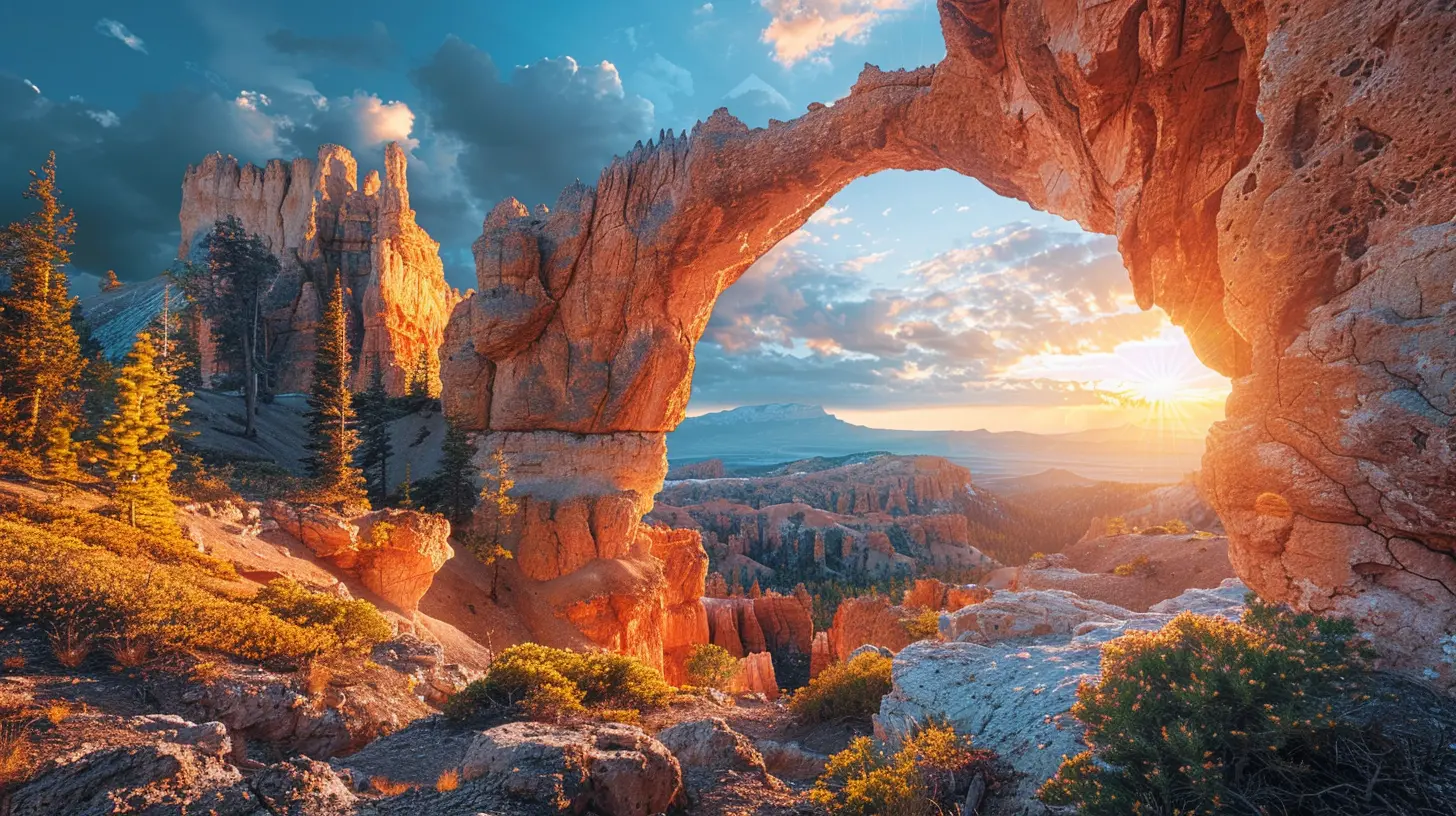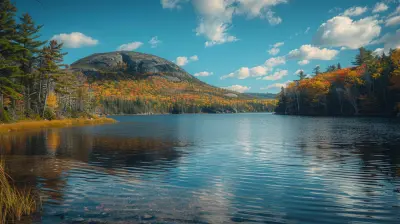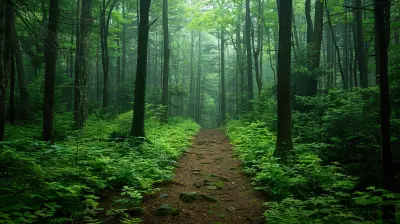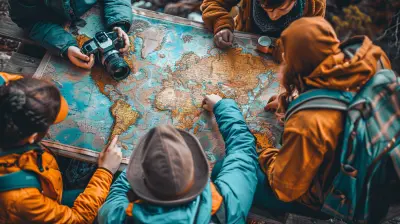Sustainable Travel Tips for National Park Visits
9 March 2025
Imagine standing at the edge of the grandest canyon, a sea of stars twinkling overhead, surrounded by nature’s most breathtaking vistas. Now picture being able to enjoy these moments while minimizing your environmental footprint. Sounds great, right? That's where sustainable travel comes into play.*
When you visit a national park, you're stepping into some of the world's most treasured ecosystems. These areas are home to thousands of species, rare landscapes, and fragile environments that deserve protection. The good news? There's a lot you can do to ensure your travel habits have a positive—or at least neutral—impact on these incredible destinations.
In this article, we’ll dive deep into practical, easy-to-follow sustainable travel tips you can implement on your national park visits. Ready to become an eco-conscious explorer? Let’s go!

Why Does Sustainable Travel Matter?
It’s no secret that tourism can have a negative impact on the environment. Large crowds can damage ecosystems, while waste and pollution are often left behind. National parks are particularly vulnerable to these effects since they rely on fragile natural resources and habitats.Sustainable travel helps to mitigate these negative impacts. By adopting certain habits, we can protect these cherished spaces for future generations. The goal is to balance enjoying the outdoors while minimizing harm to the environment and the local communities that depend on them. Essentially, sustainable travel is all about leaving no trace—or better yet, leaving places better than we found them.

1. Choose Parks Less Travelled By
Sure, Yellowstone, Yosemite, and the Grand Canyon are absolutely iconic, and no doubt, they should be on your bucket list. But, let’s face it: These spots are also the most crowded. Park overcrowding can lead to trail degradation, litter, and strain on park services.Instead, why not explore less-visited national parks? Places like Capitol Reef National Park in Utah or Isle Royale National Park in Michigan are equally stunning but see far fewer visitors. Not only will you enjoy a more tranquil experience, but you'll also help ease the burden on the heavily trafficked parks.
Tip: Try off-season travel
Consider visiting during off-peak times. Fall and spring can offer milder weather, fewer crowds, and just as much beauty as summertime excursions.
2. Take the Leave No Trace Principles to Heart
National park visits are all about enjoying nature, but that also means respecting it! The “Leave No Trace” principles are a set of guidelines designed to keep the environment as pristine as possible. Here’s a quick breakdown:- Plan ahead and prepare: Know the park regulations and trail conditions. Be realistic about your abilities and pack accordingly.
- Travel and camp on durable surfaces: Stay on designated trails to avoid trampling delicate vegetation.
- Dispose of waste properly: Trash belongs in bins—not in the woods! Pack out everything you bring in.
- Leave what you find: Picking wildflowers or taking rocks home may seem harmless, but it disrupts the natural ecosystem.
- Minimize campfire impact: If fires are allowed, keep them small, and only use designated fire rings.
- Respect wildlife: Observe animals from a distance. Never feed them!
- Be considerate of other visitors: Keep noise levels down and be mindful of shared spaces.
By following these principles, you’ll ensure that future visitors can enjoy the same unspoiled beauty.

3. Reduce, Reuse, and... REFUSE Single-Use Plastics
Plastic waste is one of the biggest threats to our national parks. Even remote locations aren’t immune to the scourge of plastic pollution. Luckily, there are several easy ways to reduce your own plastic footprint during a visit.Opt for reusable water bottles instead of single-use plastic ones. Many national parks have refillable water stations available. If you're staying for multiple days, bring reusable containers for food storage, snacks, and toiletries. And don't forget a sturdy tote bag or backpack for carrying your gear—just say no to plastic bags!
Pro Tip: Ditch the bottled water
If you're worried about water safety, invest in a portable water filter or purification tablets. It’s more eco-friendly than bringing a case of bottled water, and it can make a significant difference in reducing waste!4. Use Eco-Friendly Transportation
How you choose to get to and around the park matters. Cars emit greenhouse gases and contribute to pollution. While sometimes driving is unavoidable, there are greener alternatives.If the park offers shuttle services, use them! Many parks have implemented these systems specifically to cut down on vehicle congestion and reduce emissions. If you're close to the park's entrance, consider parking your car and walking or bicycling in.
For those venturing on longer trips, opt for public transportation when possible. Trains and buses emit far fewer pollutants per passenger than individual cars.
Bonus Tip: Consider carpooling
If you're traveling with friends or family, carpooling is an awesome way to cut your collective carbon emissions—and it might even make the road trip more fun!
5. Support Local and Sustainable Businesses
Many national parks are surrounded by small communities that rely on tourism. By supporting local businesses, you help these communities thrive in a sustainable way.Look for accommodations that practice sustainability, like eco-friendly lodges or campgrounds that use renewable energy, conserve water, or support local causes. Similarly, when dining or shopping, prioritize local eateries, farms, and artisans over large chains. You’ll often find that your money goes further in these smaller, community-driven businesses—and you’re likely to get more unique and authentic experiences in return.
Think Before You Souvenir
While it's tempting to snag a souvenir from every trip, opt for items that are either produced locally or made in an eco-conscious manner. Avoid products that exploit wildlife or delicate ecosystems.6. Respect Wildlife and Maintain Safe Distances
Remember, you are a guest in nature, and wildlife should always be observed from a respectful distance. Getting too close to animals can cause them stress and even alter their natural behaviors.Follow the park guidelines on safe distances—usually 100 yards for predators like bears and wolves, and 25 yards for other wildlife like elk and bison. And absolutely do not feed the animals! Even if it seems harmless, feeding wildlife leads to dependency on humans, which can be dangerous for both animals and visitors.
Fun Fact: Binoculars are your best friend
Investing in a pair of binoculars can make your wildlife watching experience more enjoyable and ethical. Plus, it allows you to appreciate animals in their natural habitat without disturbing them.
7. Minimize Your Carbon Footprint Through Smart Packing
When it comes to sustainable travel, what you pack matters. Instead of buying new gear for every trip, consider reusing or repurposing items you already have. Choose multi-functional clothing and gear to reduce the total number of items needed.Bringing along lightweight, durable, and eco-friendly products makes a difference too. Opt for sustainable brands—those that use recycled materials, avoid harmful chemicals, and ensure ethical production practices.
Don’t Forget: Pack out your waste!
Everything you bring into a national park should leave with you. This includes food wrappers, plastic packaging, and even biodegradable items like fruit peels if there aren’t composting options available.8. Opt for Zero-Waste Camping
If you're planning to camp in the park, aim for a zero-waste approach. This means reducing your garbage output as much as possible while maximizing the use of reusable materials.- Use reusable containers for meals and snacks.
- Avoid individually wrapped items.
- Cook meals over a camp stove (rather than an open fire) to reduce the need for extra wood.
- Bring biodegradable soap and dishwashing supplies, and use them sparingly.
Consider Solar Power
If you're planning an extended stay, invest in solar-powered gadgets. There are even solar-powered lamps, phone chargers, and stoves that let you tread lightly while still having access to those little comforts, like heated food or light at night.
9. Stick to the Trails
One of the simplest yet most effective ways to promote sustainable travel in national parks is to stay on designated trails. While wandering off the path might lead to an adventure, it can also result in erosion, harm to plant life, and even destruction of animal habitats.Sticking to trails also keeps you safe, as some areas may have unstable ground or serve as wildlife corridors. Plus, well-maintained trails offer the best views for a photo-worthy experience, without the guilt of wrecking the environment.
10. Educate Yourself and Others
One of the most important aspects of sustainable travel is education. The more you know about a park's ecosystem, history, and importance, the better equipped you'll be to protect it. Take the time to chat with park rangers, visit visitor centers, and read about the unique challenges a park faces.Beyond personal education, use your platform to encourage others to adopt sustainable habits. Whether it's through social media, blogs, or casual conversations with friends, spread the word about how easy—and crucial—it is to travel responsibly.
Share Your Knowledge
The more people understand the importance of sustainability, the more we can collectively protect our national parks. So don’t keep these tips to yourself—share them!
Conclusion
At the end of the day, visiting national parks is a privilege. These pristine places offer a retreat from the chaos of everyday life and a chance to connect with nature. By practicing sustainable travel, we can ensure that these special spaces remain preserved for generations to come.From reducing plastic waste to opting for eco-friendly transportation, even small changes in your travel habits can make a big difference. So next time you're planning your national park adventure, remember: it’s not just about enjoying the view—it's about protecting it too.
all images in this post were generated using AI tools
Category:
National ParksAuthor:

Reed McFadden
Discussion
rate this article
8 comments
Barbara Evans
Great tips! Sustainable travel is crucial for preserving our beautiful national parks. Your suggestions on minimizing waste and respecting wildlife are not only practical but essential for future generations to enjoy these stunning landscapes. Let's all commit to being responsible travelers and protect these natural treasures together! Happy travels!
April 1, 2025 at 2:30 AM

Reed McFadden
Thank you! I'm glad you found the tips helpful. Together, we can make a positive impact on our national parks! Happy travels!
Tobias Sawyer
While these tips are vital for conservation, balancing visitor experience with ecological preservation remains a complex challenge.
March 25, 2025 at 6:05 PM

Reed McFadden
Absolutely, finding that balance is crucial. Sustainable practices enhance both the visitor experience and ecological health, ensuring these natural wonders thrive for future generations.
Ardent Baker
Great insights on sustainable travel! These tips not only help preserve our beautiful national parks but also enhance the experience for all visitors. Well done!
March 22, 2025 at 4:23 AM

Reed McFadden
Thank you! I'm glad you found the tips helpful for both preservation and enjoyment. Happy travels!
Sera Wells
Sure, love nature and all, but if you think leaving your trash behind or trampling delicate ecosystems is cute, you might want to rethink your 'sustainable' travel badge. Nature's not your Instagram backdrop!
March 21, 2025 at 4:23 AM

Reed McFadden
I completely agree! Sustainable travel means respecting nature and leaving no trace. Let's all do our part to protect these beautiful ecosystems for future generations. Thank you for your feedback!
Penelope Hughes
Thank you for sharing these valuable sustainable travel tips! They are essential for preserving our national parks while enjoying their natural beauty.
March 20, 2025 at 5:49 PM

Reed McFadden
You're very welcome! I'm glad you found the tips helpful for protecting our parks. Happy travels!
Rhett McVey
This article offers valuable insights on sustainable travel. It’s a reminder that our choices in national parks can impact nature’s beauty—let’s tread lightly and protect these treasures.
March 17, 2025 at 5:19 AM

Reed McFadden
Thank you for your thoughtful comment! I'm glad you found the insights valuable—treading lightly is key to preserving our national parks for future generations.
Oriel McQuaid
Mindful choices today preserve nature for tomorrow.
March 16, 2025 at 5:31 PM

Reed McFadden
Absolutely! Mindfulness in our travel choices is key to preserving the beauty of our national parks for future generations. Thank you for highlighting this important message!
Cadence McCarthy
Exploring our nation’s parks is a privilege that comes with responsibility. By embracing sustainable travel practices, we can preserve these natural wonders for future generations. Every small action counts—whether it's minimizing waste, staying on trails, or supporting local conservation efforts. Let's tread lightly and leave a positive impact.
March 15, 2025 at 4:56 AM

Reed McFadden
Thank you for emphasizing the importance of sustainable travel! Every action truly makes a difference in preserving our parks for future generations. Let's all commit to treading lightly!
MORE POSTS

Traveling by Ferry: A Scenic Island Hopping Experience

How to Maximize Your Time in a Weekend at Acadia National Park

Around the World by Private Jet: A Journey of Elite Destinations

Wander Through Enchanting Forests: A Guide to Untouched Woodlands

How to Find Group Travel Deals and Discounts

Vibrant Local Festivals the Family Must Experience